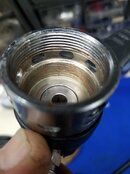fmerkel
Contributor
Do your know that would not happen with a sealed piston?
Wonder if it much matters. Wife has a MK20. Never been sealed. Probably has 1000+ dives in Puget Sound (NW, cold) waters over 20 years. Chrome is long gone. Only leaks I ever get are around the HP piston seal, or the damn HP seat, which is a common problem with this reg. Never leaks around the piston head seal near as I can tell. Always some kind of corrosion in the areas of you photo when I over haul it.
Wonder if it much matters. Wife has a MK20. Never been sealed. Probably has 1000+ dives in Puget Sound (NW, cold) waters over 20 years. Chrome is long gone. Only leaks I ever get are around the HP piston seal, or the damn HP seat, which is a common problem with this reg. Never leaks around the piston head seal near as I can tell. Always some kind of corrosion in the areas of you photo when I over haul it.




